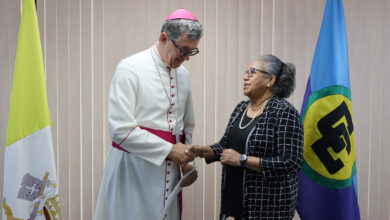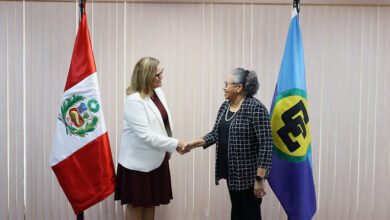“It is the firm view of the Caribbean Community (CARICOM) that the 2030 Sustainable Development Agenda offers a viable means for fostering growth and development in our region, where, despite some progress, economic transformation and sustainable development have been difficult to achieve.”
From remarks delivered today by H.E. Missouri Sherman-Peter, Ambassador/Permanent Observer for the Caribbean Community to the United Nations, to the High-Level Political Forum on Sustainable Development, convened under the auspices of the Economic and Social Council 2016 session, at UN Headquarters, New York.
See full remarks:
Economic and Social Council 2016 session High-level political forum on sustainable development convened under the auspices of the Council (agenda item 6) Session 16 Discussion on “Regional experiences” REMARKS ON BEHALF OF THE CARIBBEAN COMMNITY (CARICOM) SECRETARIAT BY H.E. EXCELLENCY A. MISSOURI SHERMAN-PETER AMBASSADOR/PERMANENT OBSERVER FOR THE CARIBBEAN COMMUNITY TO THE UNITED NATIONS UNITED NATIONS HEADQUARTERS NEW YORK, USA FRIDAY, 15 JULY 2016
Mr. President, Excellencies, Distinguished Panelists, Ladies and Gentlemen:
It is the firm view of the Caribbean Community (CARICOM) that the 2030 Sustainable Development Agenda offers a viable means for fostering growth and development in our region, where, despite some progress, economic transformation and sustainable development have been difficult to achieve.
Notwithstanding their middle-income status and relatively high placement on the human development index, most of our 14 CARICOM member states continue to face significant development challenges. These challenges include low economic growth; high unemployment, especially among youths; high debt to GDP ratios; a high food import bill; high-income inequality; and high rates of poverty.
The 2030 Agenda and its deliberate integration of the SAMOA Pathway represents an opportunity to adjust our development strategies and polices so as to promote structural change, employment, productivity gains and competitiveness, while advancing social development and environmental sustainability.
Our countries are challenged by enormous public debt, which will impact the pace at which our region can implement the sustainable development goals. High debt reduces the fiscal space needed to invest in the catalytic changes at the national and regional levels to drive sustainable development. In the absence of significant debt relief, which has not been forthcoming for Caribbean economies, we will have to rely on domestic and regional resource mobilization, particularly from the private sector, to meet development needs.
The region’s private sector and civil societies, however, do not have the sufficient capacity to effectively engage in development-oriented activities, at the national or regional levels. Focus on strengthening the capacity of both the private sector and civil society to scale up their ability to engage is critical.
The propensity of the region to rely almost exclusively on international cooperation, often delivered by our international development partners through technical cooperation, capacity building initiatives, and knowledge transfer does not always allow public/private partnerships to take off as required.
Nevertheless, our initiatives to implement 2030 Agenda will benefit from our region’s integration efforts. CARICOM integration is based on four pillars: economic integration, functional cooperation, foreign policy coordination and security. The governance structures that have been put in place to drive regional decision-making in these areas are robust. They have been designed not only to facilitate good governance, but also to achieve efficiency gains through inter alia enhancement of the commitment to harmonisation and integration; regional consensus building; reduction in transaction costs though the provision of common services; and effective use of scarce human resources.
This platform provides a solid basis for CARICOM to make a persuasive case for a more central place in development cooperation, in support of the implementation of the 2030 Agenda and the sustainable development goals.
This global initiative comes at a time when CARICOM is implementing its Strategic Plan 2015-2019. The Strategic Plan is premised on a resilience model for socio-economic progress. It targets the achievement of economic, social, environmental and technological resilience.
It emphasises the importance of addressing inequality, and advocates the mainstreaming of inclusiveness in public policy, and the adoption of integrated approaches to development. The Strategic plan can play a key role roll in streamlining and systematizing the delivery of support for implementation of the 2030 Agenda and Sustainable Development goals in the Caribbean.
Ladies and gentlemen, the Caribbean Community has made great strides to address its developmental challenges through regional integration processes. There is no doubt that implementation of the 2030 Agenda and the SAMOA Pathway will provide yet another opportunity for the region to work even more collaboratively with all stakeholders to seek solutions to those challenges that in a real sense, unwittingly limit our aspirations and constrain our development.






